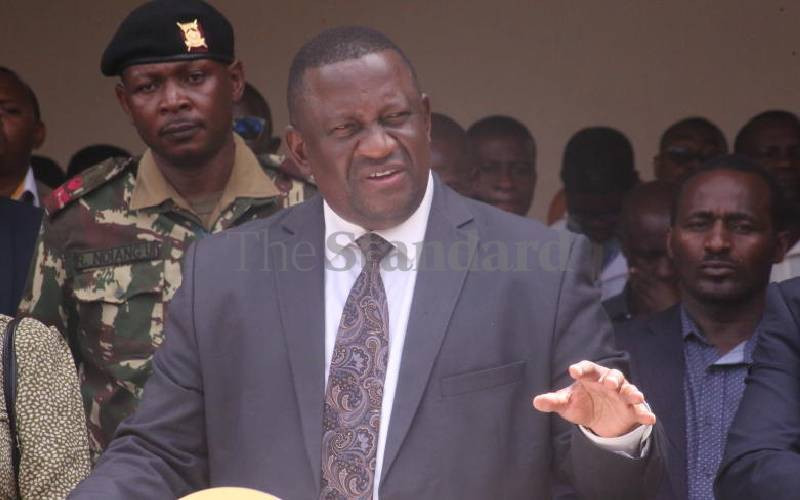Just how strong is Kenya's economy? A World Bank Report doesn't paint a rosy picture of the status of the economy.
"Anchoring High Growth: Can manufacturing contribute more?" indicates growth prospects remain positive, but warns that risks, though diminished, "remain significant."
The 11th edition of the Kenya Economic Update lists falling oil prices, improved infrastructure, investments in energy and the Standard Gauge Railways as forming the pillars driving the economy.
With the economic growth projected to rise from 5.4 per cent in 2014 to between 6 and 7 per cent in 2016 – 2017, Kenya is poised to be among sub-Saharan Africa's fastest growing economies.
This anticipation is, however, tempered with a dose of reality: Kenya, the report says, needs to take certain steps to keep the momentum. It has to fully implement the growth agenda, complete reforms at the port of Mombasa, improve efficiency of the infrastructural projects, strengthen governance and maintain macroeconomic stability. Of these, we score poorly.
Certain red flags highlighted in the report validate this statement; value -added per worker in the manufacturing sector, for example, is a fraction of what it was 30 years ago; tea production, our main export that earns on average Sh120 billion, was constant despite falling market prices; the country's expansionary fiscal policy is increasing the deficit and the debt burden.
Campaigning under the Jubilee Coalition, Uhuru Kenyatta and his running mate William Ruto made high-sounding pronouncements about turning around the economy and driving growth to double-digit figures.
The pledge was anchored on boosting manufacturing rather than services. Nearly two years after they romped into power, the growing feeling is that the voters were sold a false prospectus.
But then, Jubilee's problems are largely self-inflicted.
The economy is not growing as fast as anticipated to create more jobs because of growing threats of insecurity, the failure to dismantle corruption networks and generally, poor public services that obstruct business initiatives.
Despite or because of the half-hearted attempts to fix insecurity, tourist hotels emptied as the security inexorably deteriorated.
But then, the lack of ground-breaking policy from the Jubilee-led Government is worrying. Mr Kibaki's presidency was focused on shoring up the services industry (telcom, banking and hospitality sectors registered exponential growth) and revamping the infrastructure (roads, energy, fibre-optic networks and pipeline projects were funded optimally).
Rebasing the economy last year revealed that the economy was larger than earlier estimated, but still many feel excluded.
Simply put, the Jubilee coalition has failed to use its many advantages to advance its manifesto and agenda.
Stay informed. Subscribe to our newsletter
Despite the razzmatazz around the issuance of the $2 billion Eurobond in June last year, much remains the same for most Kenyans.
Interest rates are still high despite the low inflation rate of 6 per cent in December 2014. At $8.8 billion, the Eurobond was oversubscribed by almost four times.
The Government therefore finds itself in this position not for the want of opportunity. Quite the reverse.
The Jubilee folly is that of missed opportunities and misplaced priorities.
Its Parliamentary majority has been used to steamroller the Opposition and to push through partisan and divisive agenda that is devoid of public interest.
One would have expected that a Government that enjoys a majority in Parliament would advocate for pro-poor and pro-growth policies.
Instead, as seen in the 2014 Security Amendment Bill or the curbing of funding for NGOs and the draconian media laws, Jubilee MPs have unwittingly entrenched tyranny, celebrated sycophancy and limited the progressive values its party projected in its manifesto.
The stand-off with the media over digital migration, for example, is one such missed opportunity.
No doubt, Mr Kenyatta inherited a sound economy from Mwai Kibaki.
Yet frankly speaking, there is little that defines the UhuRuto presidency in the same way Free Primary Education and roads and other major infrastructure defined Kibaki's.
Huduma Centres, the one-stop public service points, is a noble idea, just like involving the National Youth Service in nation building. But that offers little in terms of tangible results.
If Jubilee is to salvage the remainder of its term, it will have to change course and put the public at the centre of everything.
Sadly, the Opposition has been a bystander – and perhaps yet to recover from the humiliating loss at the 2013 elections – that doesn't seem set to provide a viable option were Jubilee to implode.
 The Standard Group Plc is a
multi-media organization with investments in media platforms spanning newspaper
print operations, television, radio broadcasting, digital and online services. The
Standard Group is recognized as a leading multi-media house in Kenya with a key
influence in matters of national and international interest.
The Standard Group Plc is a
multi-media organization with investments in media platforms spanning newspaper
print operations, television, radio broadcasting, digital and online services. The
Standard Group is recognized as a leading multi-media house in Kenya with a key
influence in matters of national and international interest.
 The Standard Group Plc is a
multi-media organization with investments in media platforms spanning newspaper
print operations, television, radio broadcasting, digital and online services. The
Standard Group is recognized as a leading multi-media house in Kenya with a key
influence in matters of national and international interest.
The Standard Group Plc is a
multi-media organization with investments in media platforms spanning newspaper
print operations, television, radio broadcasting, digital and online services. The
Standard Group is recognized as a leading multi-media house in Kenya with a key
influence in matters of national and international interest.









